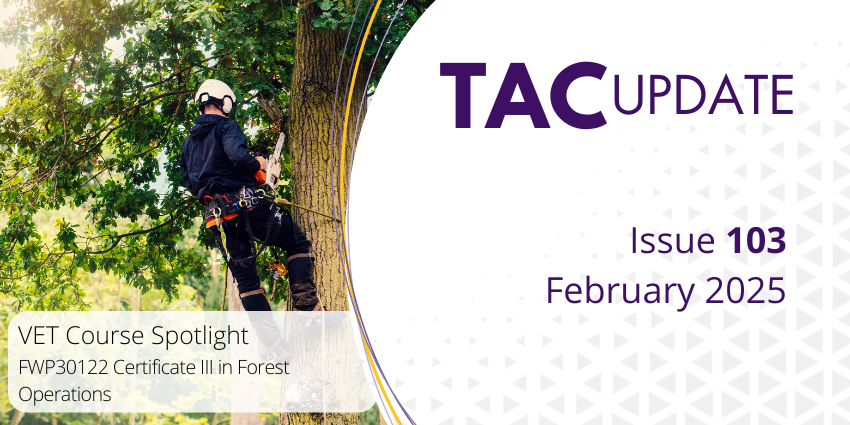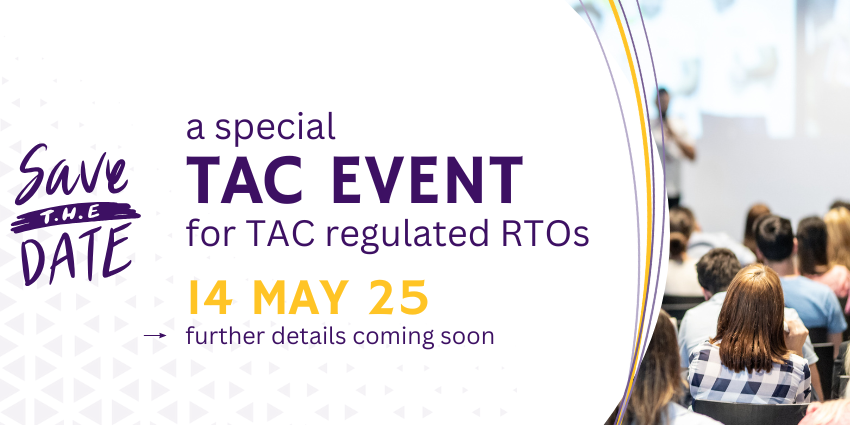
Welcome to the February Update
The Training Accreditation Council (the Council) is pleased to announce the release of its updated Risk Management Framework (the Framework). The Framework, which supports the regulation and quality assurance of the vocational education and training (VET) sector in Western Australia, is now available on the Council’s website.
As the WA VET regulator, the Council is dedicated to ensuring the quality of training services through effective regulation of providers and accredited courses. The Council has updated the Framework, ensuring it remains relevant and aligned with contemporary regulatory risk management practices and with the revised Standards.
The risk management approach used by the Council assures quality outcomes and protects the WA Government’s investment in VET. The Council believes its evidence-based, targeted and proportionate regulatory approach remains appropriate for managing risks associated with the implementation of the revised Standards. This approach is consistent with the Council’s objective of reducing regulatory burden on RTOs that deliver quality student outcomes and meet the requirements of the Standards.
The Framework recognises that most RTOs within the Council’s jurisdiction have historically demonstrated they are motivated to provide quality training and meet the Standards. The Framework acknowledges the Council’s role in providing support and education to assist RTOs in maintaining compliance, develop RTO capability, and improve their business practices to meet the revised Standards.
TAC Education Program
Upcoming Events:
Register now for our upcoming event. You can also be alerted to new events by following TAC’s Event Page on Humanitix.
- Navigating Inclusive VET Environments - for TAC RTOs Only - Mon, 24 Feb 2025, 10am - 11:30am AWST
Webinar Recordings:
View the TAC Education Program to access professional development opportunities, support and guidance materials and access previous webinar recordings and resources.
You can also watch any of the 70 videos available on TAC’s YouTube channel.
Update to FAQs on Online Guidance Hub
The FAQs on the Online Guidance Hub have been developed to assist RTOs to prepare for the implementation of the Revised Standards for Registered Training Organisations (RTOs). Find information on:
- Why are the Standards being revised;
- Clarification on trainer and assessor requirements;
- Information on Industry Experts; and
- Transition Arrangements.
Focus Article: Essential Copyright Tips for RTOs
To provide high-quality vocational training, RTOs rely on diverse resources from textbooks to newspapers, journals and online articles, however, using these resources legally can be complex. Here are five essential copyright considerations for RTOs.
1. Permission or a Licence is usually required
Most works are covered by copyright and copying text, images, or graphs without permission is typically not allowed. While copyright law allows limited use of a work for personal research or study, educators generally don’t benefit from this provision.
RTOs can use copyright material if they obtain permission from the copyright owner, or their organisation is covered by a statutory education copyright licence (see point 5). Even use of a small, integral part of a work may require permission.
2. Internet content isn’t automatically free to use
Just because content is online doesn’t mean it’s free to use. Copyright applies to both offline and online content from the moment it is created. Most websites specify terms of use, but even without them, the content is protected. Always verify usage rights before copying or sharing news articles, graphics, images and other online materials.
3. Crediting isn’t always enough
While crediting creators is important, it doesn’t replace the need for permission or licences. Moral rights under the Copyright Act 1968 (Cth) also require that authors are credited where reasonable, work isn’t falsely attributed, and alterations aren’t ‘derogatory’ (prejudicial to the creator). Economic rights often mean a licence or payment is required, even when proper credit is given.
4. RTOs are accountable for copyright compliance
RTOs must ensure their staff and casual educators comply with copyright laws. This includes responsibility for monitoring materials used in classrooms, seeking permission from copyright owners, and managing licence fees when applicable.
To streamline compliance, many RTOs use ‘blanket’ licences which covers the whole institution and allows educators immediate use of content from any source.
5. Three entities manage the ‘blanket’ copyright licences available to educational organisations
The Australian Government have appointed the Copyright Agency to manage the education copying scheme (Statutory Education Licence). With the right licences, RTOs can legally copy and share text and images for educational purposes while compensating creators.
The Australian Government has also appointed the Screenrights to manage the licence that allows educational institutions to copy and share broadcast content such as documentaries shown on television.
There are also similar arrangements available with APRA | AMCOS for music licences.
The Department of Training and Workforce Development (DTWD) are offering a series of webinars for WA publicly funded private RTOs on copyright. Registrations are now open for:
- Introduction to copyright: For private RTOs(link is external) - 20 Feb 2025
- Unlocking copyright: Essential tips for private RTOs(link is external) – 25 Mar 2025
- Copyright: Finding and using free resources for training (link is external)– 13 May 2025
AVETMISS Reporting Due
Total VET Activity (TVA) is a mandatory national reporting requirement for RTOs.
RTOs are required to collect and submit full AVETMISS data on all nationally recognised training where there is a responsibility for issuing a statement of attainment or qualification.
All publicly funded data reporting is submitted directly to the Department of Training and Workforce Development (DTWD), the State Training Authority (STA) in WA through the Training Allocation Management System (TAMS) RTO Portal.
All other data (i.e. non publicly funded data) is reported directly to NCVER. The window for reporting 2024 AVETMISS data directly is now open and closes on 28 February 2025.
More information is available:
- TAC Fact Sheet: RTO Reporting Requirement
- NCVER RTO hub
Transition Extensions
At the February 2025 meeting, the Council agreed to extend the transition period for the following training product until 30 September 2025:
- POL50118 Diploma of Policing
View the full list of training products approved for an extended transition periods.
The Council may consider requests to extend the transition period of as superseded training product when certain conditions apply. Further information is available on the TAC Website.
Other important Updates
Jobs and Skills Australia
Jobs and Skills Australia (JSA) has released the following:
Report:
Consultation:
- Jobs and Skills Australia Annual Work Plan 2025-26 - Closes 28 Feb
inviting public submissions to ensure the plan addresses current, emerging, and future workforce, skills, and training needs.



